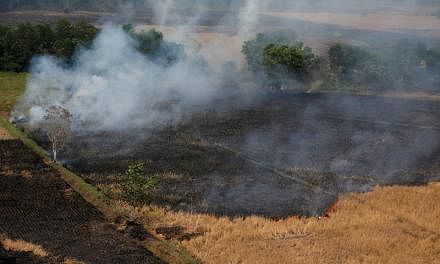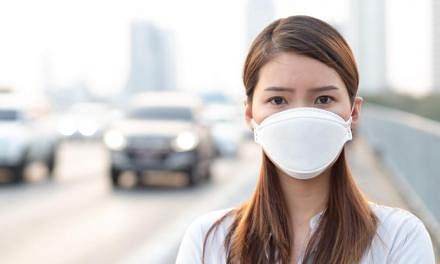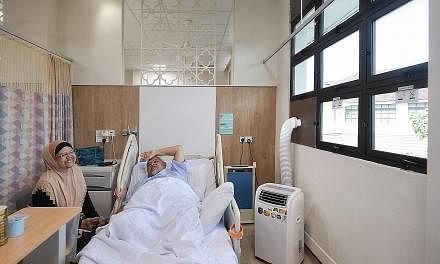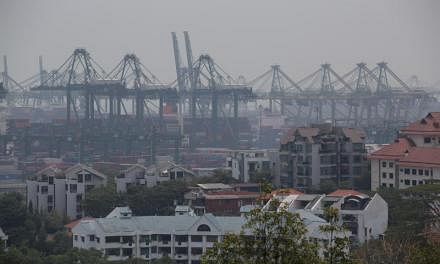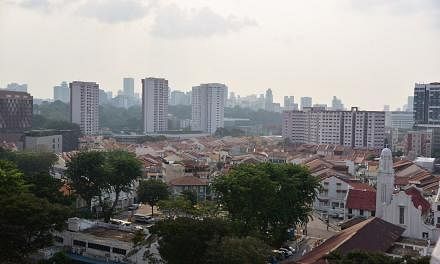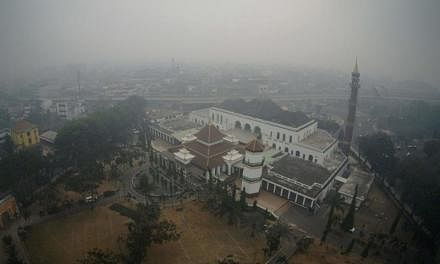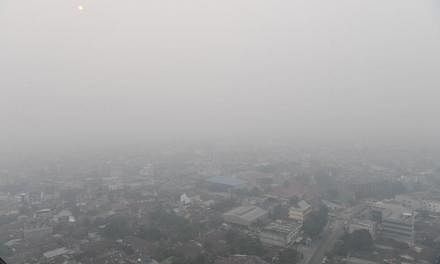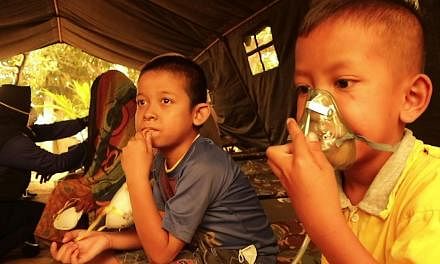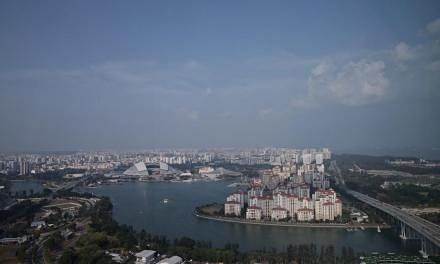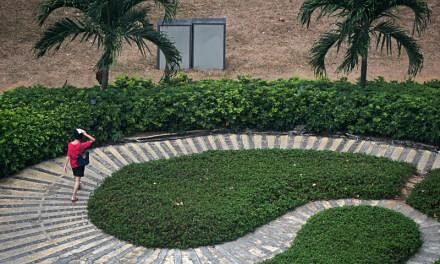MIRI/PETALING JAYA (THE STAR/ASIA NEWS NETWORK) - The haze situation in southern Sarawak has deteriorated further as cloud-seeding operations get under way on Friday (Sept 20).
The Air Pollutant Index at Sri Aman shot up to a hazardous level of 402 at 8am even as cloud-seeding attempts started in an effort to create rain.
The visibility from Kuching to Sri Aman divisions declined to very low levels, with many urban and semi-rural places seeing visibility reduced to only 200m.
Meanwhile, the government may consider deploying drones to create artificial rain as Malaysia continues to seek different ways to combat the haze in the country.
More than 2,600 schools remained closed on Friday, affecting more than 1.7 million students.
In Kuching, the various agencies in the State Disaster Relief Management Committee are trying to create rain to lessen the haze and douse local forest fires that are raging in the southern districts.
They will use an aircraft to fly from Kuching Airport to try to create rain to lessen the haze.
Most of the haze are transboundary smoke blown into Sarawak from the more than 700 hot spots currently raging in Kalimantan, Indonesia.
However, there are also smaller areas of localised wildfires burning all over the state that are contributing to the haze.
An API reading of between 0 and 50 is good while 51 to 100 is moderate, 101 to 200 is unhealthy, 201 to 300 very unhealthy, and 301 and above deemed hazardous.
On Friday, Prime Minister Mahathir Mohamad said the use of drones was mooted as an alternative to conventional cloud seeding.
"We have a suggestion to use drones to form artificial rain... We can use several drones at one time and deploy in a particular area such as Putrajaya which is badly affected by haze," said Tun Dr Mahathir at a press conference after chairing a meeting of the Special Cabinet Committee on Anti-Corruption.
He was asked about Malaysia's efforts to manage the haze crisis which has worsened.
In his typical cynical manner, he said: "We will pray for rain."
"Of course, other things that we have done include cloud seeding, advising people to wear masks and now using drones to create artificial rain," he added.
On why Indonesia did not accept Malaysia's offer of assistance to put out forest fires in the country which is causing the haze, Dr Mahathir said he had no idea.
"We offered help (to Indonesia) all the time. We have airplanes with water-bombing equipment."
"I have never asked Jokowi (Indonesian President Joko Widodo) why they do not want to receive our help. Why don't you ask Jokowi?" he said.
A total of 2,646 schools in Malaysia will be closed on Friday due to the haze situation, with more than 1.7 million students affected.
Sarawak has the most affected schools at 987, followed by 939 in Selangor, Penang (399), Kuala Lumpur (296) and Putrajaya (25), according to the Education Ministry in a statement on Thursday.
It also said that all schools in Perak and Negri Sembilan will resume classes on Friday following improvements in the Air Pollutant Index (API) readings, which have gone down to lower than 200 in the states.
The Education Ministry said that the decision was made following improvement in the API readings in the states.
It also reminded parents, teachers and students that the situation is subject to change and that officials would regularly update the list of affected schools and districts on its Facebook page, Twitter, Instagram and official website.
An Education Ministry circular dated Jan 15, 2019, states that schools must stop all outdoor activities when the API level reaches 100 and above.
Schools are ordered to be closed immediately if API readings are 200 and above.
All government and private schools in Selangor must be closed on Thursday and Friday.
As at 1pm on Wednesday, the Education Ministry said 1,484 schools in Putrajaya, Kuala Lumpur, Selangor, Sarawak, Negri Sembilan, Penang and Perak involving 1,003,310 students were closed.
The Higher Education Department has advised all tertiary institutions in states with API readings of 200 and more to postpone all lectures, as this could affect the staff and students' health.
Meanwhile, the Human Resources Ministry has recommended that employers implement flexible work policies during the ongoing haze period and allow workers to work from home, Bernama reported.
The ministry said the matter was raised at a Cabinet meeting on Wednesday, and that it was the responsibility of employers to ensure the safety and health of workers.
"It is important for employers to carry out risk assessments, take appropriate measures and to determine the need to come to work to ensure risks can be minimised," the ministry said in a statement on Thursday.
"Labour laws in Malaysia do not prohibit employers from specifying a place of employment other than those specified in a contract."
"Depending on circumstances such as haze or flood, workers can work from home as a temporary measure until conditions are restored," it said.
Under the Occupational Health and Safety Act 1994 (OSHA), the Department of Occupational Safety and Health (DOSH) may order that any occupation affected by the haze be stopped in a situation that poses a danger to the safety and health of the worker.
Any employer found not complying with the Stop Work Order under OSHA could be fined up to RM50,000 (S$16,465) or imprisoned for not more than five years or both and a further fine of RM500 for each day the offence continues, it said.
The ministry said employers should begin preparations to protect workers' safety and health against the effects of haze, including identifying workers at risk, such as those with heart or respiratory problems, and setting criteria for stopping work outside.
It said employers should ensure workers with medical symptoms such as sore throat and cough, red and watery eyes, sneezing, itching and breathing difficulty get medical attention immediately.
It also said they should identify the types of outdoor work that can be minimised, conduct proper respiratory device tests for workers who need to work outside, ensure the N95 breathing apparatus is used, improve efficiency of air purification devices for work and implement haze communication systems between employers and employees, Bernama reported.

